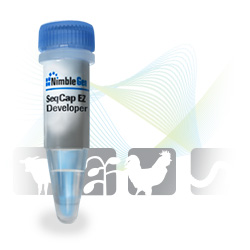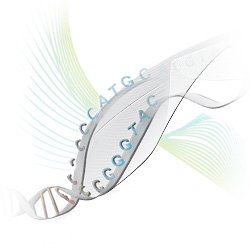Discover how custom target enrichment from Roche NimbleGen is enabling plant genomics research.
Plant genomes are known for their large genetic content, presenting challenges in whole-genome sequencing and data processing. As the leader in target enrichment for non-annotated genomes and developing custom content for plant species, Roche NimbleGen provides efficient and cost-effective methods to overcome these challenges for studying large genomes.
During this webinar leaders in agricultural research will share their research using Roche’s sequence capture technology for genotyping by sequencing in wheat, barley and maize.
Speakers

Patrick Schnable,PhD, Distinguished Professor and Director, Center for Plant Genomics, Iowa State University
Dr. Schnable is a distinguished professor at Iowa State University where he holds an endowed chair and serves as the founding director of the Center for Plant Genomics. He is also a ChangJiang Scholar Professor at China Agriculture University in Beijing. Dr. Schnable received his BS from Cornell University and was awarded a PhD in Plant Breeding and Genetics from Iowa State University. Prior to his faculty appointment Schnable conducted post-doctoral research at the Max Planck Institute for Plant Breeding in Köln, Germany.
Dr. Schnable’s scientific investigations of the maize genome have been wide-ranging and he has developed and/or deployed important genomic tools and resources. He is frequently invited to present his research at national and international venues (~60 over since 2010) and has served as a member of the scientific advisory boards of several large public-sector plant genome projects and has been invited to testify at National Academy of Sciences committees. He is the author of ~120 peer-reviewed publications, served as the co-lead author of the maize genome sequencing paper (2009, Science) and has an h-index of 47 (Google Scholar). Reflecting his interest in computational approaches to data analysis he has an Erdös number of 4.
Dr. Schnable is an elected fellow of the American Association for the Advancement of Science, serves as an associate editor for PLoS Genetics (Impact Factor 8.7), and is the chair of the American Society of Plant Biology’s Science Policy Committee. He is a past chair of the Maize Genetics Executive Committee.
Dr. Schnable is also the managing partner for Data2Bio LLC, which designs, conducts, analyzes and interprets Next Generation Sequencing projects.

Eduard Akhunov, PhD, Associate Professor – Department of Plant Pathology, Kansas State University
Dr. Akhunov received an MS in Biochemistry from Novosibirsk State University in 1992 and a PhD in Plant Molecular Biology at the Institute of Genetics – Russia in 1999. He is an associate professor at Kansas State University leading research in wheat genomics. Dr. Akhunov also serves on the editorial board of the Frontiers in Plant Genetics and Genomics. He lends his expertise to additional committees and advisory boards, including the International Wheat Genome Sequencing Consortium.
His work has covered multiple peer-reviewed publications, contributions to book chapters and numerous speaking events. His areas of research include development and application of next-generation genotyping and sequencing tools and resources, comparative genomics, population genetics and bioinformatics for understanding wheat biology and improving wheat. With advancements in next-generation sequencing, his work also focuses on development of genomic resources for high-throughput variant analysis in wheat populations by whole genome re-sequencing and exome capture approaches.
His most recent published work focused on utilizing targeted resequencing of the allotetraploid wheat genome. His collaborative work with the Wheat Barley Exome Consortium (WBEC) resulted in the development of a Wheat Exome Capture design.
Nils Stein, PhD, Genome Diversity Research Group Leader, Leibniz Institute of Plant Genetics and Crop Plant Research (IPK), Gatersleben, Germany
r. Stein earned his PhD in Genetics at University of Hohenheim (Stuttgart, Germany) in 1997. He worked as a postdoc (1998-2001) in the laboratory of Beat Keller, University of Zurich, Switzerland and moved to IPK Gatersleben in 2001 where he is working since 2007 as leader of the group Genome Diversity of the Genebank department. The main focus of his research is structural and comparative genome analysis in Triticeae species, mainly barley (Hordeum vulgare). His research has been published in more than 100 peer-reviewed manuscripts and is invited to speak widely about his work.
Additionally, Dr. Stein is co-coordinator of the European Triticeae Genomics Initiative (ETGI) and coordinates the International Barley Genome Sequencing Consortium (IBSC). He also served on the Wheat, Barley Exome Consortium (WBEC) working to develop exome designs for target enrichment of the wheat and barley genomes.
Who Should Attend?
Principle Investigators, Agricultural Researchers, Crop Scientists, Plant Geneticists, Plant Breeders
Xtalks Partner
Roche
Roche NimbleGen is an innovator in the life sciences market focused on research activities and manufacturing target enrichment probe pools for DNA sequencing. Capitalizing on the efficiencies inherent with parallel enrichment, researchers can now design economical, high throughput, and time-saving next-generation sequencing experiments. Next-generation sequencing combined with Sequence Capture probe pools offers researchers a clearer understanding of genomic structure and function in order to understand the impact of genes on biological processes. We are part of the innovations in sequencing solutions for life science research, now and in the future.
Media Partner
You Must Login To Register for this Free Webinar
Already have an account? LOGIN HERE. If you don’t have an account you need to create a free account.
Create Account





